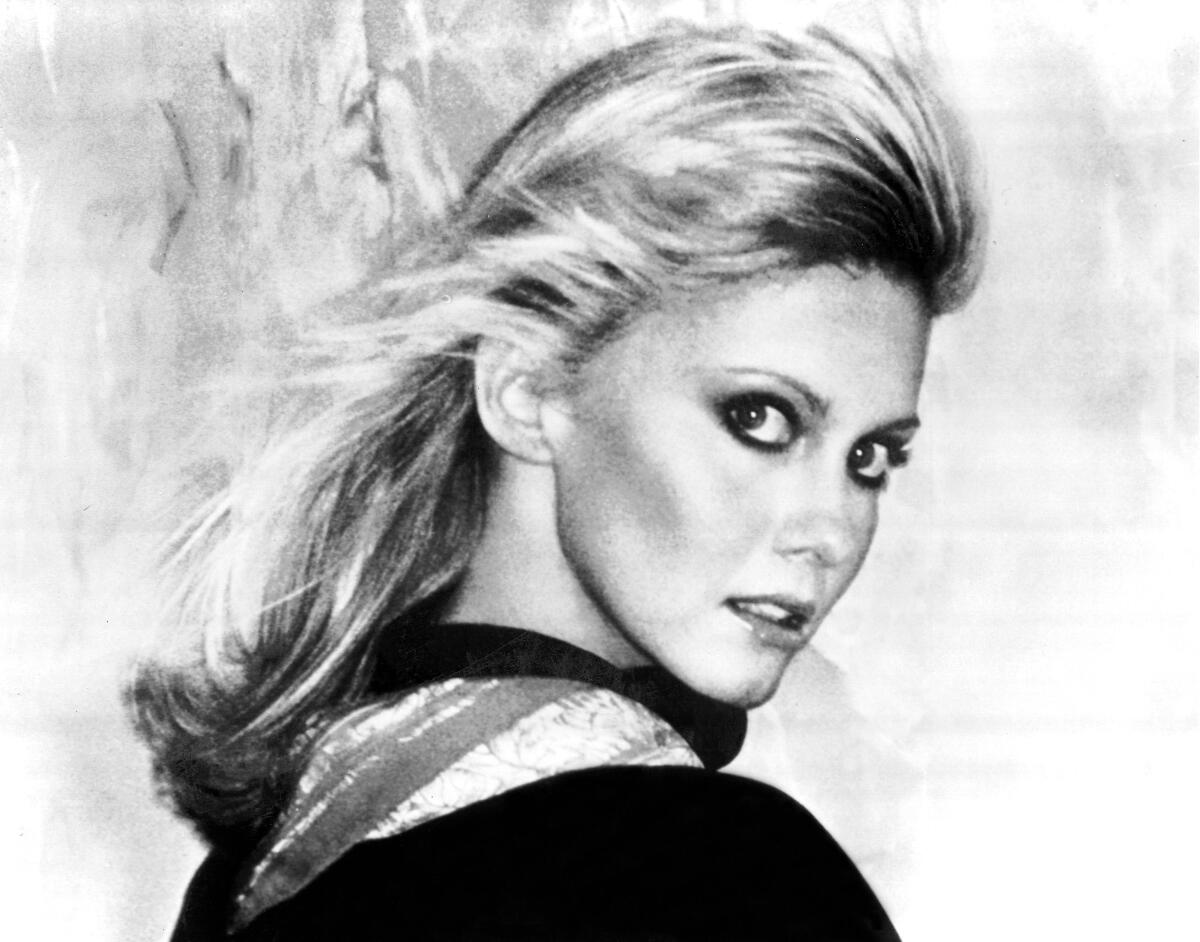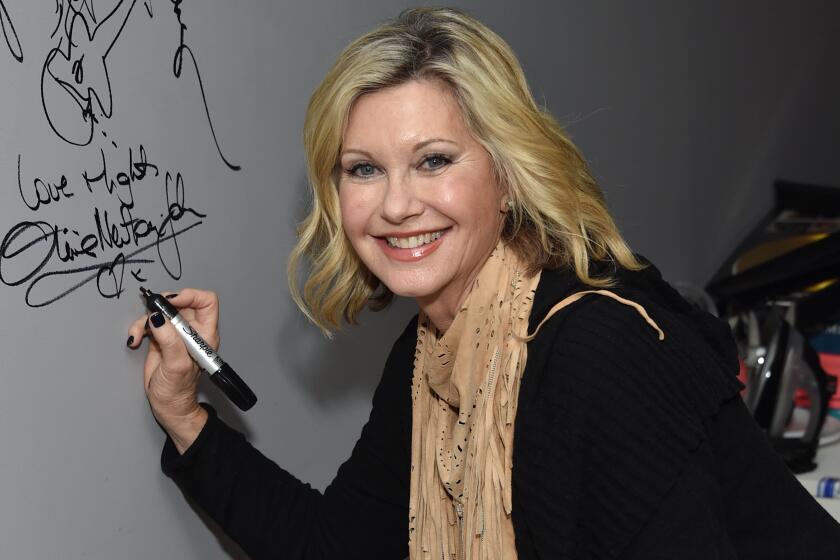An underappreciated singer, Olivia Newton-John breathed sensuality into the soft rock of the ’70s

- Share via
Olivia Newton-John played a good girl gone bad in “Grease,” the movie that turned her into a superstar in 1978. But Newton-John, who died on Monday from breast cancer at age 73, was never truly was a bad girl — whether she sang country or disco, she specialized in the mellowest rock — yet a key part of her appeal lay in how her soft touch seemed sensuous, not saccharine.
That simmering sense of seduction could reach a boil, as it did when she closed out “Grease” duetting with John Travolta on “You’re the One That I Want” while dressed in skin-tight leather or on the video to her 1981 smash “Physical,” where she happily played a seductress on the prowl.
Spending 10 weeks at the top of the Billboard charts, “Physical” became the kind of hit that redefined Newton-John’s public persona, helping to soften the blow of “Xanadu,” the 1980 roller-disco extravaganza that effectively brought her silver screen dreams to a close. “Physical” also pushed her early successes on the country charts into history, becoming a pop perennial as enduring as “Grease,” but it didn’t open another chapter in her career. It was the culmination of a decade worth of hits that made her one of the prime figures in that most unfashionable of popular music genres — easy listening or, as it came to be known, adult contemporary.

The one consistent within her decade and a half at the top of the charts is how she gravitated toward the middle of the road, finding a smooth path whether she was singing country or disco, the two styles that bookended her 1970s journey. Newton-John didn’t drive these changes so much as she navigated them, adapting to different sounds and styles with the aplomb of a showbiz natural.
That innate sense of show was cultivated in her native Australia and recognized by Don Kirshner, the producer who helped bring the Monkees to air. He attempted to bring that same prefab spirit into the future with “Toomorrow,” a 1970 science-fiction flick in which a pop group featuring Newton-John is abducted by aliens. The movie went nowhere, just like the single she recorded for Decca back in the 1960s, yet it helped raise her profile enough to land her a record contract with Pye, which released her debut album, “If Not for You,” in 1971.
‘Grease’ actor and acclaimed singer Olivia Newton-John died Monday at age 73 at home at her Southern California ranch surrounded by family and friends.
“If Not for You” found Newton-John in familiar period garb, recording such contemporary standards as Bob Dylan’s title track, Kris Kristofferson’s “Help Me Make It Through the Night” and “Me and Bobby McGee,” plus Gordon Lightfoot’s “If You Could Read My Mind.” The sounds were as familiar as the songs, pitched halfway between the delicate folk-pop of Anne Murray and the cheerful country of John Denver, yet these productions are distinguished by Newton-John’s presence. Her voice was sweet and clear, delivered with precision and a warmth that lent depth and dimension to her records. She didn’t interpret songs so much as inhabit them, a quality that came into sharp relief with her breakthrough American hits, “Let Me Be There” and “If You Love Me (Let Me Know),” songs that got their start on country radio and crossed over into pop.

Before “Grease,” Newton-John was marketed as a country singer, but Nashville never welcomed her with open arms. Once she took home the Grammy for country female vocal for “Let Me Be There” and was named the Country Music Assn.’s female vocalist of the year in 1974, Dolly Parton and Tammy Wynette formed the Assn. of Country Entertainers, an organization designed to keep such pop interlopers as Newton-John away from country music.
Looking back, it’s puzzling to think that Newton-John was seen as such a threat, particularly because her albums of the early and mid-1970s were captured in permanent soft focus. Listening more closely, particularly to the chart-toppers “I Honestly Love You” and “Have You Never Been Mellow,” it’s not hard to see this as a reaction to that sultry undercurrent in Newton-John’s gentle promises — she may be whispering her words of love, but they’re seductions all the same.

“Hopelessly Devoted to You,” the show-stopping ballad at the heart of “Grease,” became the final installment of this swaying, love-struck trilogy, but the movie pushed her out of country and firmly into pop.
The shift on “Totally Hot,” the glossy album she delivered at the end of 1978, isn’t due to new producers — she’s still working with John Farrar, who had been with her since 1973 — but a new attitude: She’s decided to ramp up punchy pop hooks on “A Little More Love” and luxuriate in the neon-lit vibe of “Deeper Than the Night.”
This spirit was carried through on “Magic,” a shimmering, muted disco song from the “Xanadu” soundtrack. The film may have flopped at the box office, but it showed how Newton-John sounded persuasive in a variety of settings: She’s at home in Jeff Lynne’s overcooked title track and duetting with a slick, cornball Cliff Richard on “Suddenly.”
Some of this versatility can be heard on the “Physical” album, which hits harder in its rhythms and guitars than her previous albums, a directness that’s mirrored by its blockbuster hit and its sequel “Make a Move on Me.”

Hardness never was Newton-John’s comfort zone, though, and the 1980s were a much harder decade than the 1970s.
The inherent warmth of 1970s studio sessions gave way to the cold, synthesized gleam of the 1980s, a sterile sound that suited her well only once: the candied faux-new wave of “Twist of Fate,” taken from “Two of a Kind,” her 1983 reunion with John Travolta.
“Twist of Fate” was her last Top 10 hit in America. After taking one last stab at the pop mainstream with 1985’s “Soul Kiss,” she retreated from the limelight, alternating between self-styled exercises in empowerment like 1994’s “Gaia: One Woman’s Journey” and returns to her roots, like 1998’s “Back With a Heart,” where she recorded “I Honestly Love You” with R&B impresario Babyface.
During the last decades of her life, Olivia Newton-John concentrated on music inspired by her work with her cancer foundation, as well as recording an inordinate number of Christmas albums (notably, she reunited with Travolta for 2012’s “This Christmas”). All this was handsome work that built upon a legacy she often embraced in public, going so far as to sing “Physical” with the cast of “Glee” in 2010.
A better reflection of the breadth and depth of Newton-John’s influence may be “Juliana Hatfield Sings Olivia Newton-John,” a 2018 tribute from the indie-rock stalwart. On the surface, Hatfield appears to be an unlikely acolyte, as she’s always played guitar-rock on the fringe of the mainstream, yet her salute to her first musical heroine illustrates the broad appeal of Newton-John. Punk rockers and pop idols were both drawn to the slightly ethereal, eternally sweet hits she had at her peak, soft rock so dreamy that it can still sound as if it’s floating in the air.
More to Read
The biggest entertainment stories
Get our big stories about Hollywood, film, television, music, arts, culture and more right in your inbox as soon as they publish.
You may occasionally receive promotional content from the Los Angeles Times.











